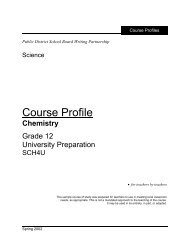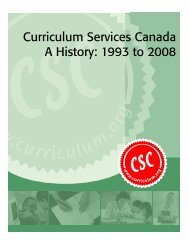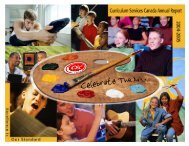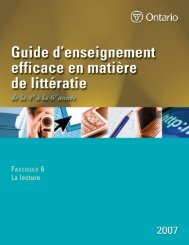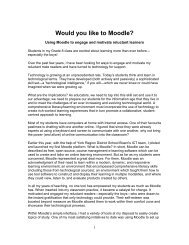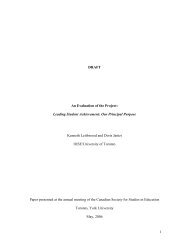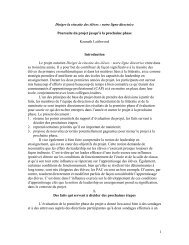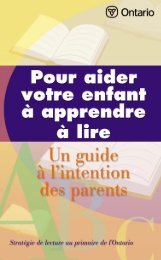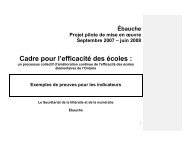Course Profile - Curriculum Services Canada
Course Profile - Curriculum Services Canada
Course Profile - Curriculum Services Canada
You also want an ePaper? Increase the reach of your titles
YUMPU automatically turns print PDFs into web optimized ePapers that Google loves.
2e - use and integrate the Catholic faith tradition, in the critical analysis of the arts, media, technology,<br />
and information systems to enhance the quality of life;<br />
3d - make decisions in light of gospel values with an informed moral conscience;<br />
3e - adopt a holistic approach to life by integrating learning from various subject areas and<br />
experiences;<br />
4a - demonstrate a confident and positive sense of self and respect for the dignity and welfare of<br />
others;<br />
4b - demonstrate flexibility and adaptability;<br />
5a - work effectively as an interdependent team member;<br />
7j - contribute to the common good.<br />
Strand(s): Writing, Language, Media<br />
Overall Expectations:<br />
WRV.02D - identify the literary and informational forms suited to various purposes and audiences and<br />
use the forms appropriately in their own writing, with an emphasis on supporting opinions or<br />
interpretations with specific information;<br />
LGV.01D - use knowledge of vocabulary and language conventions to speak, write, and read<br />
competently using a level of language appropriate to the purpose and audience;<br />
MDV.02D - use knowledge of a variety of media forms, purposes, and audiences to create media<br />
works and describe their intended effect.<br />
Specific Expectations:<br />
WRI.04D - use the information and ideas generated by research to develop the content of written<br />
work;<br />
WR2.01D - demonstrate an understanding of literary and informational forms, such as myths, poems,<br />
short stories, scripts, advertisements, formal letters, reviews, and supported opinion essays, by<br />
selecting and using forms of writing appropriate to different purposes and audiences;<br />
WR2.02D - select first or third person and an appropriate level of language to suit the form, purpose,<br />
and audience of written work;<br />
WR4.03D - make constructive suggestions to peers;<br />
LG1.02B - identify and explain examples of slang, jargon, dialect, colloquialism, as well as of standard<br />
Canadian English, in literary texts and their own oral and written work;<br />
LG1.04B - select words and phrases appropriate to informal and formal styles, to suit the purpose and<br />
intended audience of oral and written work;<br />
LG2.02D - communicate in group discussions by sharing the duties of the group, speaking in turn,<br />
listening actively, taking notes, paraphrasing key points made by others, exchanging and challenging<br />
ideas and information, asking appropriate questions, reconsidering their own ideas and opinions,<br />
managing conflict, and respecting the opinions of others;<br />
LG2.03D - plan and make oral presentations to a small group or the class, selecting and using<br />
vocabulary and methods of delivery to suit audience and purpose;<br />
LG2.04D - use specific examples, facial expressions, gestures, intonation, humour, visual aids and<br />
technology, as appropriate, to engage the audience's interest during oral presentations;<br />
LG2.07D - analyse their own and others' oral presentations to identify strengths and weaknesses, and<br />
plan ways to improve their performance;<br />
MD2.02D - create media works for different purposes and explain how each has been designed to<br />
achieve its particular purpose;<br />
MD2.03D - create media works appropriate to different audiences and explain why a particular design<br />
should appeal to a particular audience.<br />
Unit 5 - Page 17<br />
•English - Academic



